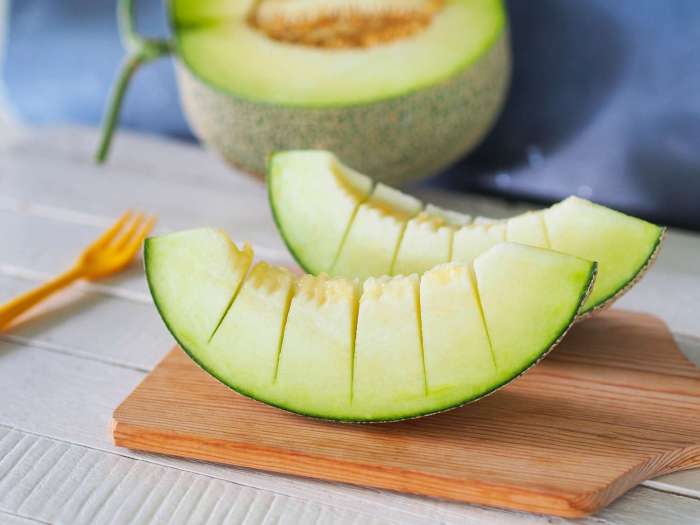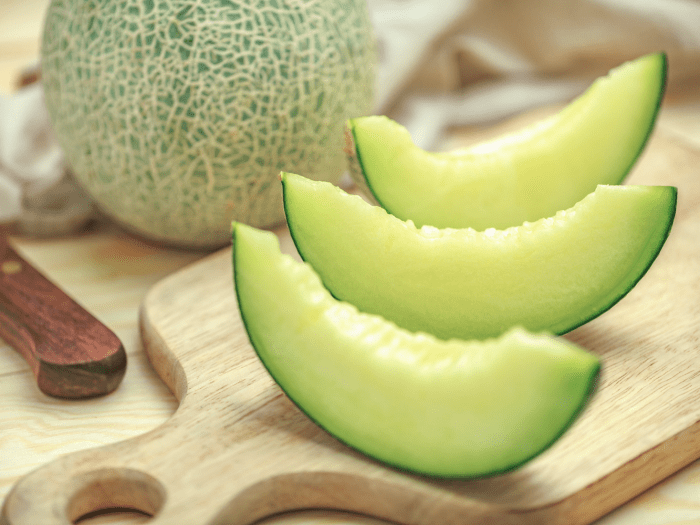Health Benefits and Potential Risks

Honeydew melon nutrition facts – Honeydew melon, a refreshing and sweet summer treat, offers a surprising array of health benefits thanks to its nutrient-rich composition. Beyond its delicious taste, this melon contributes to overall well-being in several significant ways, while also presenting some considerations for mindful consumption.Honeydew melon’s impressive nutritional profile supports various aspects of health. Its high water content contributes significantly to daily hydration needs, crucial for maintaining optimal bodily functions.
Furthermore, it’s a good source of antioxidants, particularly Vitamin C, which combats free radicals and helps protect cells from damage. The melon also provides essential vitamins like Vitamin A and potassium, contributing to healthy vision, immune function, and blood pressure regulation.
Hydration and Antioxidant Properties
Honeydew melon’s high water content makes it an excellent choice for staying hydrated, especially during warmer months or after physical activity. This is particularly beneficial for maintaining healthy kidney function and preventing dehydration-related symptoms like fatigue and headaches. The significant Vitamin C content acts as a powerful antioxidant, neutralizing harmful free radicals that can contribute to cellular damage and chronic diseases.
Studies have linked regular consumption of foods rich in Vitamin C to a reduced risk of heart disease and certain types of cancer. The combination of hydration and antioxidant benefits makes honeydew melon a valuable addition to a healthy diet.
Vitamin Contributions and Other Nutrients
Beyond Vitamin C, honeydew melon is a source of other essential vitamins and minerals. It contains Vitamin A, crucial for maintaining good vision and supporting immune function. The melon also provides a decent amount of potassium, an electrolyte vital for regulating blood pressure and maintaining fluid balance. These nutrients, combined with its fiber content, contribute to overall health and well-being.
A serving of honeydew melon can be a significant contributor to the recommended daily intake of these vital nutrients.
Potential Risks of Excessive Consumption
While generally safe, excessive consumption of honeydew melon can lead to some potential downsides.
Right, so honeydew melon, innit? Loads of vitamins, keeps you lush. If you’re after something a bit more zesty though, check out the nutrition facts for mandarin oranges – they’re proper juicy. But yeah, back to honeydew – it’s dead low in cals, perfect for a healthy snack, bruv.
- High Sugar Content: Honeydew melon is relatively high in natural sugars. Excessive intake could contribute to weight gain and potentially exacerbate conditions like diabetes if not managed carefully within a balanced diet.
- Gastrointestinal Issues: Consuming large quantities of honeydew melon, especially on an empty stomach, might lead to digestive discomfort such as bloating or diarrhea due to its high fiber and sugar content.
- Allergic Reactions: While rare, allergic reactions to honeydew melon are possible. Symptoms can range from mild skin irritation to more severe reactions requiring medical attention.
Nutritional Comparison with Similar Fruits, Honeydew melon nutrition facts
Compared to other melons like cantaloupe and watermelon, honeydew melon boasts a slightly higher potassium content and a similar Vitamin C level. Watermelon generally has a higher water content and lower sugar, while cantaloupe offers a slightly higher concentration of beta-carotene (a precursor to Vitamin A). The choice among these fruits often depends on individual preferences and dietary needs.
However, all three offer a refreshing and nutritious option for a healthy diet. For example, a serving of honeydew melon might contain slightly more potassium than a comparable serving of watermelon, making it a beneficial choice for individuals seeking to improve their potassium intake.
Visual Representation of Nutritional Information

Unlocking the nutritional powerhouse within honeydew melon requires a clear understanding of its composition. Visual aids offer a compelling way to grasp this information quickly and effectively. We present two distinct visual representations to illuminate the nutritional profile of this refreshing fruit.
Honeydew Melon Macronutrient Composition: A Pie Chart
Imagine a vibrant pie chart, a visual feast reflecting the macronutrient breakdown of honeydew melon. The largest slice, perhaps occupying around 80%, would represent water, highlighting honeydew’s high hydration content. A smaller slice, maybe 15%, would showcase carbohydrates, representing the natural sugars providing energy. A tiny sliver, perhaps only 5%, would depict the minimal contribution of protein and fat, emphasizing its low-calorie nature.
The chart’s color scheme could utilize refreshing hues of green and yellow to visually connect it to the fruit itself. Each slice would be clearly labeled with its corresponding nutrient and percentage. This pie chart instantly conveys the dominance of water and carbohydrates, offering a clear picture of honeydew’s macronutrient profile.
Vitamin and Mineral Comparison: A Bar Graph
Now, picture a dynamic bar graph comparing the vitamin and mineral content of honeydew melon against other popular fruits like oranges, bananas, and strawberries. The horizontal axis would list the fruits, while the vertical axis would represent the quantity of a specific nutrient, say Vitamin C. Each fruit would have a colored bar indicating its Vitamin C content.
For example, a tall bar for oranges would clearly showcase their high Vitamin C levels, while a slightly shorter, but still substantial, bar for honeydew melon would demonstrate its significant Vitamin C contribution. Repeating this for other key nutrients like Potassium and Vitamin A would create a comprehensive comparison, allowing for a quick visual assessment of honeydew’s nutritional standing among its fruity peers.
The use of distinct colors for each fruit and nutrient would enhance clarity and readability, making the nutritional comparison immediately accessible.
Expert Answers: Honeydew Melon Nutrition Facts
Can honeydew melon cause digestive issues?
Excessive consumption of honeydew melon, like any high-fiber fruit, may lead to bloating or mild digestive discomfort in some individuals.
Is honeydew melon suitable for weight loss diets?
Its low calorie density and high water content make honeydew melon a potentially helpful addition to weight-management plans, contributing to satiety without excessive caloric intake.
How can I store honeydew melon to maintain its freshness?
Store whole, uncut honeydew melons at room temperature until ripe. Once cut, refrigerate in an airtight container for up to 3-4 days.
Are there any interactions between honeydew melon and medications?
No significant drug interactions are currently documented with honeydew melon consumption. However, individuals with specific health concerns should consult their physician.



